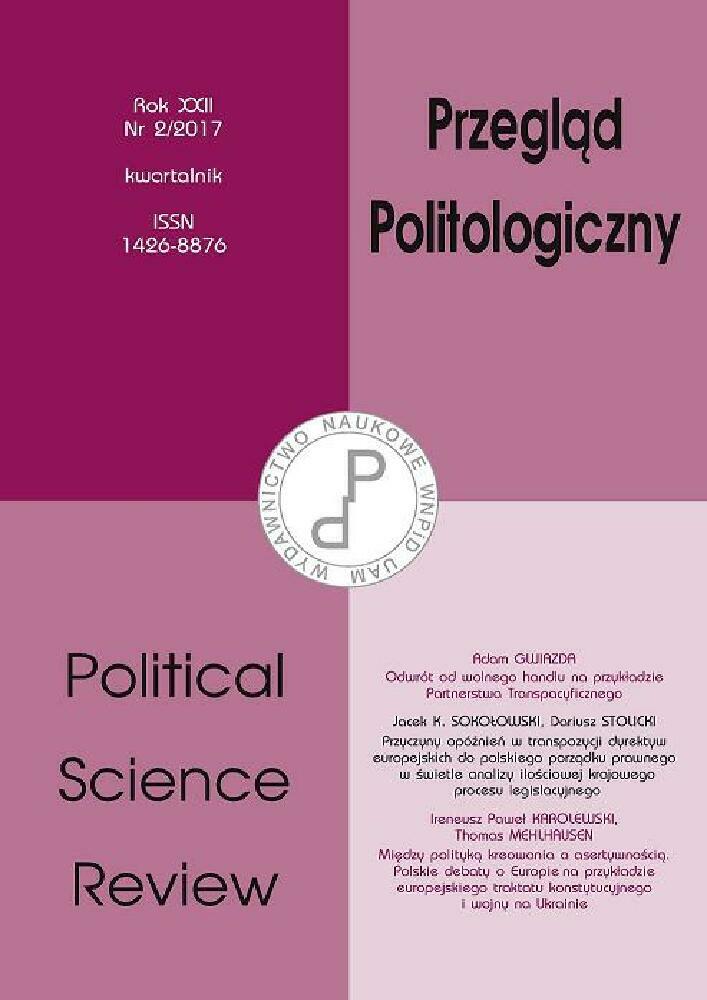Abstrakt
W ostatnich paru latach do władzy doszły w niektórych państwach zachodnich partie prawicowe, które bardziej posługują się argumentami politycznymi i nie dostrzegają korzyści, jakie niesie ze sobą wolny handel. Przykładem może być Parnterstwo Transpacyficzne (TPP), które miało doprowadzić do przyśpieszenia handlu i wzmocnienia współpracy gospodarczej w regionie Azji i Pacyfiku. Partnerstwo to miało też być przeciwwagą dla ekspansji gospodarczej Chin w tym regionie. Stany Zjednoczone wspierały prawie 7-letni proces negocjacji i doprowadziły przy końcu 2015 roku do podpisania porozumienia o utworzeniu TPP. Do początku 2017 roku porozumienie to nie zostało jednak ratyfikowane przez parlamenty państw członkowskich, a w lutym 2017 roku prezydent Donald Trump wycofał USA z tego partnerstwa. Stworzyło to szansę dla Chin, które forsują swoją koncepcję Regionalnego Kompleksowego Partnerstwa Gospodarczego (RCEP) i osłabiło zaufanie do Stanów Zjednoczonych wśród wielu dotychczasowych sojuszników tego mocarstwa.
Bibliografia
Bajekal N. (2015), What will the Trans-Pacific Partnership do?, „Time” 12.10.
Bremmer I. (2017), Trump’s New World order press nation over Globe, „Time” 23.01.
Cohn T. H. (2011), Global political economy, New York.
Davis A., Blass E. (2007), The future of workplace: views from the floor, „Futures”, nr 39.
Eberstadt N. (2016), Men without work: America’s invisible crisis, West Conshohocken Templeton Press.
Fenson A. (2015), Can TPP rescue global economy?, „The Diplomat” 11.10.
Foroohan R. (2016), Is China stealing US jobs? Not exactly, „The Times” 11.04.
Foroohan R. (2016), After decades of consensus the value of global free trade is being contested by the left and the right, „Time” 11.04.
French E. (2017), The US, Japan, and trade: what Trump can learn from the 1990s, „The Diplomat” 7.02.
Goto S. (2010), Could the TPP actually divide Asia?, „The Diplomat” 22.10.
Habisch A., Popal P. (2013), Ethik und globaler Handel, „Aus Politik Und Zeitgeschichte” 30.12.
Kobrin S. J. (2005), Multinational Corporations, the Protest Movement, and the Future of Global Governance, w: Leviatans. Multinational Corporations and the new global history, red. A. D. Chandler, B. Mazlish, Cambridge.
Mildner S. (2009), Die Doha-Runde der WTO, „SWP-Studie”, nr 1. Vanishing jobs (2016), „The Economist” 20.09.
Niedziński B. (2017), W miejsce TPP może wejść Państwo Środka, „Dziennik Gazeta Prawna” 9.02.
Olson S. (2017), Evaluating 100 Days of Trump Trade Policy, „The Diplomat” 8.05.
Panda A. (2015), Trans-Pacific Partnership: prospects and challenges, „The Diplomat” 9.10.
Roberts D., Felton R. (2016), Clinton turns against the global economy as Americans Mount cost of trade Deal, „The Observer” 21.08.
Slaughter M. J. (2013), Free trade can lift US exports, „The Wall Street Journal” 24.01.
Strange S. (1996), The Retreat of the State, New York.
The Trans-Pacific Partnership: every silver lining has a cloud (2015), „The Economist” 10.10.
Woltersdorf A. (2017), Trans-Pacific Partnership: a sinking ship, „International Politics and Society” 12.02.
WTO (2016), World Trade Statistical Review 2016, Geneva. Blumenstein Rebecca: wywiad z Michaelem Fromanem pt. On a mission to free trade (2013), „The Wall Street Journal” 25.11.
Yough A. R. (2007), Negotiating with diminished expectations, w: The WTO after Hong Kong, red. D. Lee, R. Wilkinson, London–New York.
